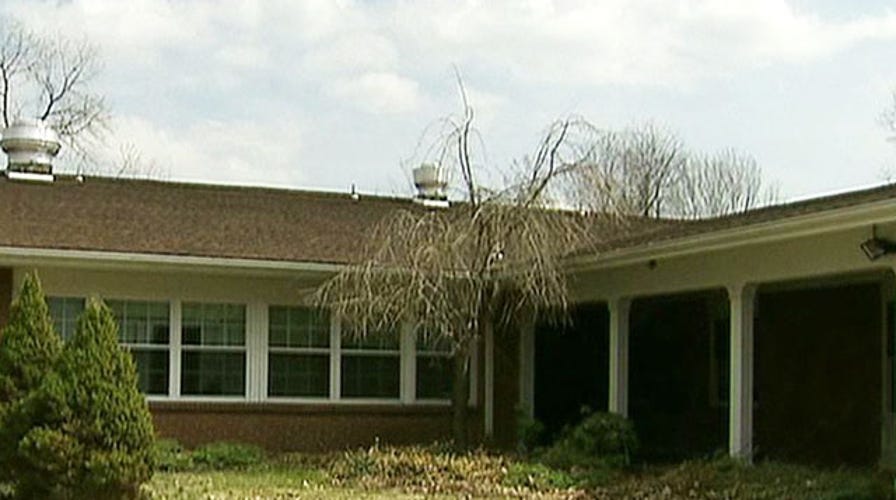Josh and Lauren Egan were newly married when they bought their first home in Rocky Hill, Conn., and were looking forward to raising a family in the Hartford suburb.
Now, they and other residents of their neighborhood worry that they will be living alongside child molesters, rapists and other ex-cons. The state has contracted with a private company to move severely ill prisoners -- who are being paroled or released from prison for medical or compassionate reasons -- into a former nursing home that sits right behind their house.
"It's prisoners living next door, and it's not one or two of them. It's 95 of them," said Josh Egan. "We're going to call it what it is. It's not a nursing home, it's a prison. They are prisoners, coming from prison. My grandmother is in a nursing home. This is definitely not where I'd send my grandmother."
The facility has been vacant for about a year and a half. The state has contracted to funnel what it says are the most debilitated prisoners -- those at the end of life; suffering from Alzheimer's disease or dementia; or otherwise incapable of caring for themselves -- to the nursing home. By doing so, they estimate they will save about $6 million of state taxpayer money in prisoner health costs. When inmates who require 24-hour skilled nursing care are incarcerated, the state picks up the whole tab. Yet if the prisoners are moved to a nursing facility, the federal Medicaid program pays 50 percent of the cost, though that still represents money provided by taxpayers.
But that is little comfort to the neighbors whose homes surround the property the nursing home sits on.
"I'm really mad," said Tony Fabi, whose backyard abuts the nursing home. "My kid can't even play in the back yard, thinking that someone might escape, jump over a stockade fence that they are putting up. Are you kidding me?"
Nicole Crawford said she is "horrified, to put it bluntly. ... I would not let my children play in the yard. I wouldn't feel safe letting them play in the one place they should feel safe, in their own yard."
State officials defend the decision.
"It is something that is going on in every state, and we are just trying to have an efficient way to make referrals and place these inmates in a nursing home," insists Mike Lawlor, Connecticut's under secretary of criminal justice policy and planning, who is the state's point man on the issue.
Lawlor said that he understands "that the neighbors are apprehensive, and they have every right to be apprehensive," but he insists that the prisoners will pose no threat to anyone, citing their severe medical conditions.
"If there is a danger, they won't be placed here or in any other community-based residential program. ... These are very, very sick people. There are plenty of very, very sick people who continue to pose a danger that we would not consider for such a placement, but there are sick people who, by any medical or criminal justice analysis, no longer pose a threat to anybody and those are the ones who would be in the facility."
He said some of the patients are not mobile, and also notes that there is a locked unit for dementia patients, with security and two parole officers who will be on site.
"We release people like this to nursing homes all the time," Lawlor noted, saying that last year 20 patients were sent to various homes across the state, while 16 prisoners died waiting for transfer.
With the nation's aging prison population, "the number in this category is getting bigger and it is a little easier to do it if you have set aside a dedicated nursing home."
However the state's assurances are not enough for the town, and neighbors are not convinced the residents won't be a danger.
"These are not people who belong in a convalescent home, they belong in a prison," said Rocky Hill's Acting Mayor Timothy Moriarty. "They say that they are at the end of life, but you know what? They committed a crime and they should do the time."
The town has filed suit to challenge the state plan, claiming the facility owners did not get the proper approval from the town in order to operate.
"This is something that just came out of nowhere, we weren't warned about it or even approached about it, we just found out about it in the 11th hour," Moriarty said of the state's plan. "It seems like there was something, you know, swept under the carpet here to try to make this thing happen without us being aware of it."
The owner of the home has filed a motion to dismiss the town's lawsuit, and Lawlor insists the operator followed normal procedure to gain approval to open as a nursing home. He notes, though, the owner did not disclose plans to contract with the state to accept patients from prisons and the mental health hospital.
"There is nothing about this nursing home that will be different than a regular nursing home," Lawlor said.
Meanwhile, the construction workers are busy preparing the facility for its new patients, who will receive similar nursing care as the former residents. There is a carpeted dining hall, fenced in outdoor space and the expected medical equipment of any nursing home.
The nursing home's license could come from the state Department of Health at any time, and soon after the first patients could arrive.
Fox News' Meredith Amor contributed to this report.





